Below by Jason Chabot
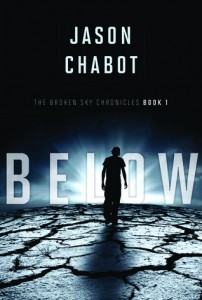 Summary: In what appears to be a post-apocalyptic version of our world, people live Above on floating islands that rest above the clouds, unhindered by bad weather because in the upper atmosphere nothing blocks them from the sun, moon and stars. The only life Elia knows is Above, but when the islands start descending and breaking apart and Elia finds herself caught up in a mystery she doesn’t understand, events conspire to put her Below. Completely out of her element and convinced the Scavengers who take the dead bodies from Above away are going to get her, Elia runs into Hokk, a resident of Below who has been banished to the Prairies for ten years. Meeting each other reveals parts of their shared world they never knew about, and starts them on a journey to unravel secrets kept by those in charge of Above and Below.
Summary: In what appears to be a post-apocalyptic version of our world, people live Above on floating islands that rest above the clouds, unhindered by bad weather because in the upper atmosphere nothing blocks them from the sun, moon and stars. The only life Elia knows is Above, but when the islands start descending and breaking apart and Elia finds herself caught up in a mystery she doesn’t understand, events conspire to put her Below. Completely out of her element and convinced the Scavengers who take the dead bodies from Above away are going to get her, Elia runs into Hokk, a resident of Below who has been banished to the Prairies for ten years. Meeting each other reveals parts of their shared world they never knew about, and starts them on a journey to unravel secrets kept by those in charge of Above and Below.
Number of Pages: 310
Age Range: 13-15
Review: Below by Jason Chabot plunges his reader into a world where three main societies exist. Those who live Above, those who live Below, and those who have been exiled to the mountains.
Living Above seems like a dream. With dark skin and two sets of eyelids, the people are perfectly adapted to live as close to the sun as they do in an environment unsheltered by cloud cover. For those Above there is no rain, there are no storms, and lightening is something that happens under the ground instead of in the air. Elia is part of a monarchy ruled by twin emperors, and she works as a laundry maid in the kingdom. One day while she is working she comes across a mysterious bone and her life is never the same. The bone is the first of the toppling dominoes in Elia’s life, all leading up to her falling Below.
Except Below for those Above is a scary place. All of their dead are dispatched to Below, with the understanding this will appease the monster-like Scavengers they believe in. When Elia gets there though, having the great fortune to land in water instead of crashing into the earth, nothing is as she expected. There are no Scavengers, and a whole society exists that Elia never knew about. When she meets up with Hokk and his fox Nym, the information they exchange about their two disparate lives is eye opening for both. Clearly secrets are being kept in both places, and Hokk uses Elia as a cover to get back into the city he’s been exiled from, promising to help her get back Above.
It definitely has the feel of a first book in a trilogy (the Broken Sky Chronicles to be exact), and I know from the author book two is coming out in six months. While it was more of an introduction, there was enough to hook me and make me want to read the next book, Above. I just have to know what happens. Will Chabot reveal if the islands came from Earth or the Moon? Will Elia find the other lady that fell from Above and also didn’t die? What is the secret that reveals the fallibility of the twin emperors? Will Elia ever see her family again? Can Hokk control his attraction to arson? So many questions I can’t wait to learn the answers to.
My favourite part was that as science fiction fan, I was engaged from the start. I liked the characters, I wanted to know more about how the world developed and the mystery of it all was well-paced with action-packed, heart-pounding moments. The creepiest part is how I can already see it as a possible future for human race. Can’t wait to see where Chabot will take it.
Memorable Quotes:
“Before long, he had to stop the gazelk and get off. In the persistent rain, he sunk to the wet ground on hands and knees, his head hanging down. He wanted to vomit, to rid his stomach of the horror he felt inside. He gagged and his eyes watered, but nothing more. The horror could not be expelled. He would have to carry it with him.” – Hokk from Below by Jason Chabot, pages 33-34
Below by Jason Chabot is published by HarperTrophy Canada, (2014).
The Beckoners by Carrie Mac
 Summary: Moving from Prince George to Abbotsford, British Columbia for her mother’s work leaves Zoe less than impressed. When she starts a new school, she is taken under Beck’s wing, a girl with a group of loyal followers who are eager to do what she tells them to. Initially attracted to the Beckoners as they are called, things take a turn as Zoe encounters their darker side – the bullying of a girl they call Dog, the boyfriend who rapes members of the group, and the initiation ritual. The more Zoe learns, the less she wants to do with them, but getting out and beating the Beckoners at their own game is going to take ingenuity, courage, and pain.
Summary: Moving from Prince George to Abbotsford, British Columbia for her mother’s work leaves Zoe less than impressed. When she starts a new school, she is taken under Beck’s wing, a girl with a group of loyal followers who are eager to do what she tells them to. Initially attracted to the Beckoners as they are called, things take a turn as Zoe encounters their darker side – the bullying of a girl they call Dog, the boyfriend who rapes members of the group, and the initiation ritual. The more Zoe learns, the less she wants to do with them, but getting out and beating the Beckoners at their own game is going to take ingenuity, courage, and pain.
Number of Pages: 217
Age Range: 15-17
Review: I’m up to three Carrie Mac books read (counting titles read outside of my Marathon of Books) and what they all have in common is that I simply can’t put them down. The Beckoners is no exception. Zoe lives with a self-involved mother named Alice who leaves the care of Zoe’s baby sister Cassy mostly to her. Moved to yet another place against her will, Zoe is understandably upset and resentful.
This resentment meets up with Beck who knows how to harness it, and Zoe becomes a Beckoner. Not because she necessarily wants to be, but because she is egged on by group dynamics and wanting to prove herself.
Beck, the villain of the story, is oddly sympathetic. Yes, she uses her personal pain as motivation to surround herself with a gang and become the most feared person at school, but even she seems to know when they’ve gone too far. Her home life is abusive, and it seems Beck may have learned how to inflict physical and emotional pain from personal experience.
April, the victim, has moments when she directly antagonises her bullies. She does it on purpose, trying to get revenge, but her attempts only land her in more trouble time and time again.
Zoe is the outsider who bridges the gap between the two. She may start as a Beckoner, and she may not always like April, but she comes around and realises April still doesn’t deserve to be treated the way she is. I loved reading about Zoe the most because she’s constantly struggling between wanting to fit in and wanting to protect those who need it.
The ending is clever, and I was surprised by it and thankful for it. After all that had been done, to April, to Zoe, to Shadow and to Jazz, responsibility and justice were welcome, although it was disturbing how they were brought about.
The Beckoners is a compelling examination of the power of psychological bullying, the importance of hope and the desperate need for people to speak up against harmful behaviour. Simon’s rant against Beck was stunning, because finally, finally someone refused to be silent. Zoe’s friendship with Simon definitely helps her get to the point where she can speak out too. And in the end, it can be assumed that justice prevails.
Memorable Quotes:
“Bad move, Heather, Zoe thought. Don’t ever tell Zoe that she can’t do something. Don’t tell her how she’s going to react. Don’t presume to know her, when you don’t. Don’t think for one nasty little slice of a second that you’re so almighty you’ve got her figured out. Go home, Heather, and rot in your palatial princess suite, with its antique sleigh bed and in-floor heating and dedicated phone line. Zoe forgot all her doubts about being associated with the Beckoners. In that moment, she just wanted to prove Heather wrong.” – from The Beckoners by Carrie Mac
“Poor Malcolm. He kneeled in the pool of whiskey, ducking his head to hide the tears, his blue underwear peeking out from the folds of the sheet, singing his song over and over as he picked up the glass. He looked so pathetically embarrassed and wilted, Zoe wanted to steer him out of there and take him home and keep him until he was big enough to punch Heather in the face and do some real, lasting damage that would require reconstructive surgery that could be conveniently botched.” – from The Beckoners by Carrie Mac
The Beckoners by Carrie Mac is published by Orca Book Publishers, (2004).
Gravity by Leanne Lieberman
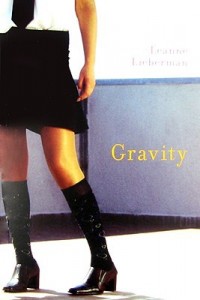 Summary: When her Orthodox Jewish parents spend the summer in Israel, Ellie spends the summer with her Bubbie at a cottage in Northern Ontario. Meeting the girl next door changes Ellie’s life as she realises her attraction to Lindsay isn’t just about her secular ways, but also about the fact that Ellie is attracted to women. At the end of the summer, Ellie’s family reunites, but all are changed. Ellie’s questioning what her sexuality means when it comes to her religious beliefs, her sister Neshama is more determined than ever to make her escape to university, and their parents have a renewed sense of religious fervour. Together they explore the meaning of belief in God, and the different forms it takes.
Summary: When her Orthodox Jewish parents spend the summer in Israel, Ellie spends the summer with her Bubbie at a cottage in Northern Ontario. Meeting the girl next door changes Ellie’s life as she realises her attraction to Lindsay isn’t just about her secular ways, but also about the fact that Ellie is attracted to women. At the end of the summer, Ellie’s family reunites, but all are changed. Ellie’s questioning what her sexuality means when it comes to her religious beliefs, her sister Neshama is more determined than ever to make her escape to university, and their parents have a renewed sense of religious fervour. Together they explore the meaning of belief in God, and the different forms it takes.
Number of Pages: 239
Age Range: 15-17
Review: In one summer Ellie’s whole world changes when she realises the future of getting married and raising children she expects as an Orthodox Jew is in jeopardy because she is attracted to girls.
Ellie’s inner struggle over this discovery about herself is complex. She’s smart and knows how to search the scriptures herself for the opinion of her religion on being gay. And when people she does trust tell her it’s wrong to be gay, similar to a bad habit, Ellie does her best to rid herself of this ‘bad habit.’ When it doesn’t go away though, she also has the guts to stand up for herself and embrace who she is.
Reading the part about Ima, Ellie’s mother, made me angry. The scene where she begins singing along with the Canter in synagogue was beautifully described, and it was clear that Ima was communing with God in a way others weren’t capable of doing. But when her singing caused pettiness from others and brought shame on her family, causing them to go to new schuls, I was heartbroken. Although it turned out for the best when the new schul welcomed women singing, and both men and women singing together added a whole new dimension to their worship.
My favourite, favourite part in a book filled with thought-provoking conversations and complicated characters was when Ellie comes to realise being attracted to the same sex does not mean she can’t believe in God or be devout. Her dream is to have everything she would have had if she had married a man, only with a woman, and to share her beliefs and religious practices with the one she loves.
In Gravity, author Leanne Lieberman has examined the intertwining of lives in a close-knit devout family. Each member is dealing with their own crisis of faith, and deals with it in their own way. I love how Neshama is simply fed up with her parents’ expression of being Orthodox Jews, but still encourages her sister to find her own way to encourage her beliefs. Ima seems to have legendary stories of how her journey toward connection with God took her from considering becoming a nun to falling in love and marrying Abba, an Orthodox Jew. Abba himself is convinced that following the rules set out in the Torah will bring him closer to God, and that perhaps if Jews had been more devout in the past, the Holocaust wouldn’t have happened in the first place.
All are characters worthy of the reader’s empathy as they struggle with the larger questions of life. Lieberman does such an artful job of putting her reader in each family member’s shoes that there is no one to blame or dislike. I may have personally though Ellie’s parents were a bit over-the-top at times, but Lieberman helped me understand why.
I enjoyed the concept of God as a force similar to gravity and love, and I loved Lieberman’s demonstration of faith playing out in a real life situation. I’m greatly looking forward to reading more of her work.
Memorable Quotes:
“God is too big an idea to even hold in my head all at one time, vaporous and, well, enormous. it’s like trying to think about the whole ocean all at once. I can only focus on one mollusk or seaweed tendril at a time.” – Ellie from Gravity by Leanne Lieberman, page 14
“I always thought Abba was religious because of the Holocaust. I once overheard Bubbie ask Abba why he ‘bothered keeping all those crazy rules.’ Abba said that if the Jews had been more observant, the Holocaust would never have happened.
‘Bullshit!’ Bubbie cried. ‘Is that what your parents believed? No!’
Abba shrugged. “That’s my opinion.’
When I ask Bubbie about it later, her nostrils flared in disgust. ‘Ellie,’ she told me, ‘the Holocaust happened because Hitler was crazy and because no one cared a damn about the Jews. Now it’s not like that. Everyone like us, in Canada anyway.” – Conversation between Bubbie and Abba about keeping Jewish laws from Gravity by Leanne Lieberman, page 112
“I’m so sick of a mean God who insists on stupid stuff like only eating animals with split hooves. How does that make you a better person? I can’t believe how many generations of crazy men believe all that crap. They only do it to oppress women. Garburetors are work? Who does the cooking in all those crazy ways on Shabbos? Why would you believe any of it?’
‘I…I…I don’t know. Because Shabbos is good,’ I say weakly.
‘So rest on Shabbos, but don’t follow stupid rules on how to rest. It’s just a book, El.’
‘A book inspired by God,’ I whisper.
Neshama scoffs. ‘Can you even prove that God exists? Can you?’
When I pray, the words reverberate through my chest and esophagus, filing my head. They ground me, like bull kelp, thick and bulbous, rooted to the ocean floor, yet still moving, undulating in the waves. How to explain this to Neshama?'” – Conversation between Neshama and Ellie from Gravity by Leanne Lieberman, page 140
“I stand on the street, stunned. That look on Lindsay’s face. I’ve never seen it before. She’s trying to escape from herself. I know it. She doesn’t like herself. I’ve never seen her like that, unconfident, or weak. My mouth fills with a bitter taste. All along I’ve admired Lindsay, wanted to be like her, but not now. She doesn’t have any idea what it really means to escape, what sacrifice it entails.” – Ellie from Gravity by Leanne Lieberman, pages 203-204
“I slump in my car. ‘I really miss the Torah.’
‘So go back to it.’
‘I don’t think I can.’
‘Maybe for you it doesn’t have to be all or nothing. Make the Torah whatever you want it to be. It’s so huge and contradictory, you can find whatever you want and ignore the other parts. Everybody does it.’
‘You think?’
‘I know. Just don’t take it as the word of God.’
‘Do you think Ima does?’
‘Ima floats along in her own little world, taking in the parts that fit her life. Woman can’t sing in public – I bet she finds a way out of that one.’
‘And Abba?’
Neshama shudders. ‘He really doesn think the Torah is the word of God, but I try and cut him some slack because everything he does, misguided as it is, come from his love for Hashem.’
We both sigh. Then Neshama gets up and pulls me through the circle of dancing, stomping women, weaving into the center. Grabbing my hands she leans back and starts to turn. I shriek and pull back harder, the room spinning.” – Conversation between Ellie and Neshama from Gravity by Leanne Lieberman, pages 209-210
Gravity by Leanne Lieberman is published by Orca Book Publishers, (2008).
Losing Faith by Denise Jaden
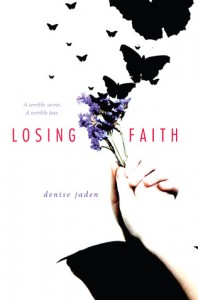 Summary: When Brie’s older sister Faith falls off a mountain and dies, her family is plunged into grief as they struggle to understand what happened. As Brie tries to unravel the events leading up to Faith’s death, she’s also dealing with a cheating boyfriend, a best friend who would make a good enemy, and parents who are so overcome that they hardly notice her anymore. Thankfully Tessa, a Goth girl from school, takes Brie under her wing because she knows what loosing a sibling is like. Together, along with Alis, the brother of someone Brie didn’t know Faith was friends with, they will uncover the truth of Faith’s death to put to rest whether it was an accident or suicide.
Summary: When Brie’s older sister Faith falls off a mountain and dies, her family is plunged into grief as they struggle to understand what happened. As Brie tries to unravel the events leading up to Faith’s death, she’s also dealing with a cheating boyfriend, a best friend who would make a good enemy, and parents who are so overcome that they hardly notice her anymore. Thankfully Tessa, a Goth girl from school, takes Brie under her wing because she knows what loosing a sibling is like. Together, along with Alis, the brother of someone Brie didn’t know Faith was friends with, they will uncover the truth of Faith’s death to put to rest whether it was an accident or suicide.
Number of Pages: 381
Age Range: 14-16
Review: Part mystery, part exploration of religion and faith as well as grief, Losing Faith by Denise Jaden is about two sisters who despite growing up together don’t seem to know each other very well.
Raised in a family with religious beliefs, when Brie falls away from her faith and stops going to church the sisters drift apart. Faith’s belief in God takes its own turn as she gets involved with a cult with a charismatic leader able to hypnotise her followers.
But Brie doesn’t know about Faith’s secret life, and the night she turns up dead, Brie believes she is at a local youth group meeting. Bit by bit, through Brie’s determination, Faith’s story unfolds after her death, and Brie is left wishing she had known her sister better while she was alive.
Tessa ending up being my favourite character, because I thought she was well-developed. Living with a father who still believes she is six years-old because he’s caught up in past grief, Tessa lives with her own guilt and grief over her sister’s death. Her mother no longer lives with them, and any attempt Tessa makes to assert the fact that she has grown up is met with pretty serious denial and opposition. Dressing like a Goth is a way for her to make her outsides match her insides, and I loved how she gradually comes to embrace herself as she is again.
The friendship that grows between Brie and Tessa is mutually beneficial in that respect. I don’t know what Brie would have done without her as Faith’s death makes her an oddity at school, but Tessa needs her too as Brie is a good, empathetic listener who helps Tessa sort through her emotional baggage. Though Jaden touches on bigger themes of what belief in God constitutes and how it is practised differently by various people, this friendship, more than the mystery and the cult aspect, was what kept me reading.
Memorable Quotes:
“‘A terrible thing about Tessa
Is how she grew up too fast
Shoes too big and too small all at once.
A terrible thing about Tessa
Guilt, a weighty stone around her neck
Undeniably amiss for six.
A terrible thing about Tessa
The force she had to use, and still,
It took someone so long to know her
To really see her.
There are many terrible things about Tessa
But she
Is not one of them.'” – poem by Brie from Losing Faith by Denise Jaden, page 364
Losing Faith by Denise Jaden is published by Simon Pulse, (2010).
Torn Away by James Heneghan
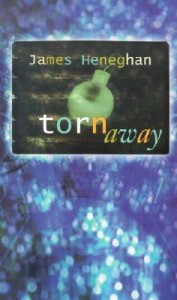 Summary: Alone in Ireland after the violent deaths of his whole family, Declan joins the Holy Rollers, a militant terrorist group made up of teenage boys bent on getting revenge against the Protestants and the English. The idea of making people pay is all-consuming, and when his Uncle Matthew sends for him from Canada, Declan does absolutely everything he can to stop himself from being taken out of his country. Once in Canada, living in British Columbia, he’s still determined to make his escape, until his Uncle Matthew and Aunt Kate make a deal with him to stick it out for three months with the offer of sending him back to Ireland at the end if he still wants to go.
Summary: Alone in Ireland after the violent deaths of his whole family, Declan joins the Holy Rollers, a militant terrorist group made up of teenage boys bent on getting revenge against the Protestants and the English. The idea of making people pay is all-consuming, and when his Uncle Matthew sends for him from Canada, Declan does absolutely everything he can to stop himself from being taken out of his country. Once in Canada, living in British Columbia, he’s still determined to make his escape, until his Uncle Matthew and Aunt Kate make a deal with him to stick it out for three months with the offer of sending him back to Ireland at the end if he still wants to go.
Number of Page: 256
Age Range: 13-15
Review: With gripping action and a main character who is always strategising to achieve his endgame, getting revenge on the British and Protestants for the deaths of his mother, father and younger sister, Torn Away by James Heneghan is the story about Declan, a young teen overcome by a need for vengeance.
And, living in Northern Ireland in the early 1990s, he has plenty of opportunity. Caught in an ongoing and violent feud between Catholics and Protestants, Irish and British, Declan has learned how to hate and how to hurt. It’s no surprise he does not want to go to Canada to live with his uncle, or that he fights every step of the journey it takes to get there.
When it came to Declan facing his bully at school, I felt sorry for the bully. Pair a kid whose parents have died, who knows how to kill small animals by making an apple into a weapon and who can build bombs against a kid who knows how to hurt people with his words and it’s kind of like bringing a knife to a gun fight. I thought Declan giving the guy a ‘Belfast Kiss’ was letting the bully off extremely easy considering the amount of anger Declan had in him and his extensive knowledge of how to harm people.
I like Heneghan’s message. Like Susan White’s “Ten Thousand Truths,” he shows his reader that love and the land have the power to heal. Declan describes his uncle’s family as fixers and they are. They’ve taken in an orphan, a widow whose house burned down and a child who was abandoned as a baby because he had Down Syndrome. They rescue a seal pup and nurse it back to health. And though Declan resists at every turn, their care for him finds its way into his heart, providing him with a choice between hatred in Ireland and love in Canada.
The physical space is also a factor. They live close to an ocean, and the landscape itself works its magic on Declan because it is vast enough to contain his anger and sorrow. Challenged by nature on more than one occasion, Declan finds a new focus for his creative energies. The characters Heneghan surrounds Declan with are heartfelt and unique, and I loved them all.
I enjoyed learning more about the conflict in Ireland and the larger ramifications of the pain it has caused, and I hope to read more Heneghan books in the future.
Memorable Quotes:
“He remembered the squirrel. It made no sense, any of it. How could Ana and Thomas and Kate get so upset over the death of a rodent – that’s all it was – when on the other side of the world they’d killed his sister and his ma, innocent people blown to pieces?” – Declan from Torn Apart by James Heneghan, page 133
“It is the last he ever sees of his ma and his sister, two dark wooden boxes, one of them small, on the shoulders of the IRA pall-bearers. He watches, his face pale in the cold spring sun. The pain he feels is unbearable, but he wants to guard it and nourish it so it will grow, and when it has grown powerful enough it will explode.” – Declan from Torn Apart by James Heneghan, page 153
“He watched the snow piling up on the branches of the trees, bending them lower and lower with its weight. When it seemed that the overladen branches were about to snap, they sprang suddenly back, catapulting showers of powdered snow into the air.
He turned. The ocean stretched out in front of him, flat and glimmering under a leaden sky. He stood in the cold brightness of the snow and felt the vast strength and peace of the land melting into him.” – Declan from Torn Apart by James Heneghan, page 243
Torn Away by James Heneghan is published by Orca Book Publishers, (2003).
Sister Wife by Shelley Hrdlitschka
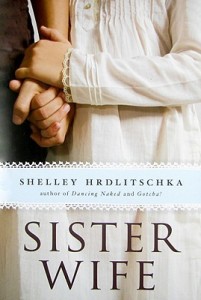 Summary: Faced with an impending arranged marriage within her Unity community, Celeste finds herself having doubts and falling for a boy named Jon instead. Spurred on by the stories of Tatianna, a girl taken in by the community while she gets back on her feet, and discouraged by her sister Nannette, a fervent believer in the way of the community who dreams of the day when she will become a sister wife, Celeste must decide for herself whether she will submit to becoming the multiple wife of an older man. Fearful of losing her family and hindered by strict religious life she has always known, Celeste’s unlikely friendship with a boy who builds inuksuik in the river opens her eyes and heart to new possibilities, helping her find the courage to choose something different.
Summary: Faced with an impending arranged marriage within her Unity community, Celeste finds herself having doubts and falling for a boy named Jon instead. Spurred on by the stories of Tatianna, a girl taken in by the community while she gets back on her feet, and discouraged by her sister Nannette, a fervent believer in the way of the community who dreams of the day when she will become a sister wife, Celeste must decide for herself whether she will submit to becoming the multiple wife of an older man. Fearful of losing her family and hindered by strict religious life she has always known, Celeste’s unlikely friendship with a boy who builds inuksuik in the river opens her eyes and heart to new possibilities, helping her find the courage to choose something different.
Number of Pages: 269
Age Range: 15-17
Review: Told from the perspectives of three young women living in the Unity community, Sister Wife by Shelley Hrdlitschka explores the role of women in a polygamous community in a thoughtful, well-rounded manner.
Tatianna is an older teen adopted by Unity to rescue her from a life on the street selling her body. Taken in by Celeste’s and Nannette’s family, Tatianna finally has a place where she is secure and provided for. She forms loving relationships, makes friends and becomes an integral part of the household.
What she brings with her though is a knowledge of the outside world, and it bleeds into her contact with sheltered young girls raised in a strict religious environment. Nannette is the type that accepts life as it is, dreaming of the day when she will be married with sister wives and babies of her own. Celeste, on the other hand, is already questioning her situation and soaks in Tatianna’s stories.
Hrdlitschka covers several topics that are potential minefields in teen fiction through her book: teen prostitution, polygamy, underage marriage, and rape. Each girl’s story is unique and highlights various aspects of the community from the obvious abuses of power and male-centred society to the joy of living in community. Hrdlitschka is a talented storyteller because while I was sick over Celeste’s situation, forced to marry her love interest’s father, I found I was actually somewhat pleased Nannette married the same man.
I feel like I should explain myself before those reading this review think I’m pro-polygamy. What I appreciated about Sister Wife was how Hrdlitschka accurately portrayed how different people react to the same situation. Celeste and Nannette are sisters from the same mother and father, but for Celeste marriage is a descent into hopelessness, and for Nannette, it’s everything she ever wanted. While logically I knew both marriages were shady and coerced, having Nannette’s viewpoint was insightful because she was still happy.
At its heart, Hrdlitschka has written a story about an essential aspect of growing up, learning how to question one’s reality. For Celeste it comes in the form of pondering the true nature of spirituality and God, and for Nannette it’s about seeing the discrepancies and choosing to believe anyway. It’s an engaging read full of excellent character development and skillful dramatic tension. Hrdlitschka’s writing style is beautiful and full of insight.
Memorable Quotes:
“There is such a routine here, such a structured lifestyle, that I suppose a person doesn’t really need to think much about it at all. Conformity is what they strive for, not individuality. Everything is laid out, from what you’re expected to contribute right down to what you wear. Even your husband or wife is chosen for you. Maybe it’s not the thinking that is Celeste’s problem, but the questioning.” – Taviana from Sister Wife by Shelley Hrdlitschka, page 11
“How I’d love to share this moment with Jon. I know he’d agree with me that God is not in the religious ranting. He is not in the rules, or even in the sacred book. He is here, in the beauty of this divine morning. He is in the music of the birds, in the colors of the sky and even in the goose bumps on my arms. The realization of this makes me dizzy.
I hear the door creak open behind me. Swinging about, I find Pam there, looking as surprised to see me as I am to see her. I mover over on the step and pat the space beside me. She smiles shyly and joins me there without a word. We continue to gaze at the miracle in front of us, at the new day unfolding. For a rare moment I feel at peace.” – Celeste, from Sister Wife by Shelley Hrdlitschka, page 129
“Just as I knew he would, Father has ordered me to remain in the house. I have no problem with that. I have nowhere to go now anyway.
When he hauled me into his office after I returned from the beach, his anger was like a summer storm, a sudden crash of elements. The room was electrified by his fury, and I wanted to cower in a corner. But, unlike the aftermath of a summer storm, the air was not left freshened when it was over. It was full of tension, and the pain I felt was a physical ache, not because of the anger I caused my father but from the pain of losing Jon.” – Celeste from Sister Wife by Shelley Hrdlitschka, page 144
“‘So if a person doesn’t believe in God,’ I ask him, ‘what makes them behave?’
He considers that. ‘Their conscience. Do you only behave when you think someone is judging you?’
‘God is always judging me,’ I tell him, though I have to admit, I haven’t always behaved.
‘But just for the sake of argument, Celeste, imagine that He isn’t. Would you start doing unkind or bad things?’
‘I don’t know.’ The concept is just too strange for me. God has always been part of my life.
‘Celeste, I don’t believe you would. You’re a good, kind loving person, whether God is watching you or not.'” – Conversation between Celeste and Craig about the nature of belief in God from Sister Wife by Shelley Hrdlitschka, page 257
Sister Wife by Shelley Hrdlitschka is published by Orca Book Publishers, (2008).




 Amy Mathers has been passionate about reading from a very young age, and hopes others will share her enthusiasm for funding a teen book award.
Amy Mathers has been passionate about reading from a very young age, and hopes others will share her enthusiasm for funding a teen book award. 





